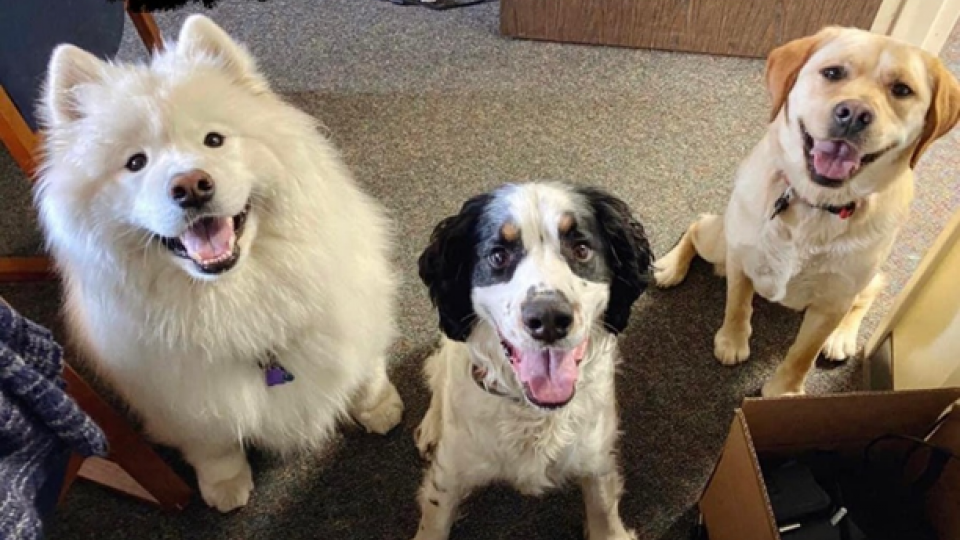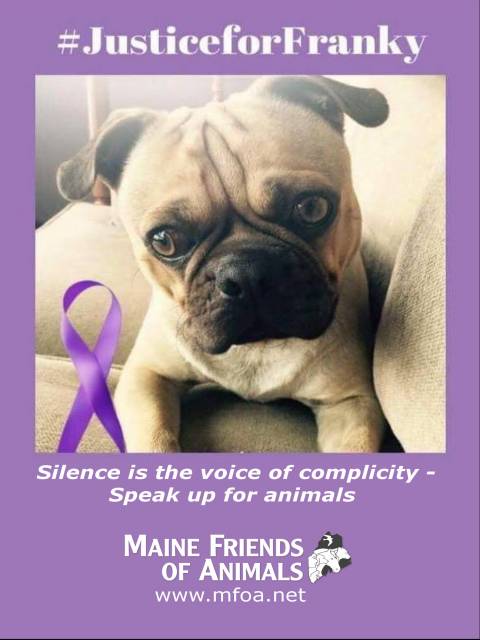
Second-in-the-nation legislation becomes law in Maine!
“An Act to Provide for Court Appointed Advocates for Justice in Animal Cruelty Cases” (Franky’s Law)
The link below is a 2022 Animal Legal Defense Fund (ALDF) video explaining the program.
https://aldf.org/article/courtroom-animal-advocate-programs-caap/
View WCSH-TV Peggy Keyser, ‘207’ show interview
NOTE: If you are a Maine attorney or know of an attorney who might be interested in participating as a court advcoate, or you are a law student at the University of Maine School of Law and might be interested in the program, please contact us at info@mfoa.net
In late 2016, MFOA learned of first-in-the-nation legislation in which the Connecticut Legislature passed Public Law 16-30, often referred to as “Desmond’s Law.” Under this legislation, a judge presiding over an animal abuse case involving a dog or a cat has the option of appointing a volunteer, either a supervised law student or an attorney, to work with the prosecutor to advocate for the animal in the interest of justice. It was outside the box thinking, and MFOA immediately decided to introduce it to the Maine legislature.
Covid set back the initial start of the program and being only second-in-the-nation, we wanted to be assured that it would be implemented successfully. Many kudos to founder Robert Fisk, Jr. and two Board of Directors Casey Webster and Bonnie Martinolich for seeing the program come to fruition. The program, administered by MFOA, currently has six Maine attroney advcoates and two Maine of School of Law student advocates.
Desmond’s Law is named for a shelter dog that had been adopted and repeatedly tortured and ultimately strangled to death in 2012. According to the Hartford Courant, “Despite a recommendation by the prosecutor for prison time, the man charged in the crime received accelerated rehabilitation, which meant that his charges were dismissed and his record was wiped clean.” The public outcry was immediate and Desmond’s Law was born!
A similar Maine case of aggravated animal cruelty occurred against Franky the pug in Winter Harbor last year and hence the renaming of the Maine bill to “Franky’s Law.”
The advocate may monitor the case, consult with individuals who may have information helpful to the judge, attend hearings and present information or recommendations to the court pertinent to the interests of justice. A list of attorneys is kept with knowledge of animal issues and the legal system is kept, as well as law students who are or may be interested as serving as a volunteer advocate.
It is no secret that prosecutors are overloaded with other criminal cases viewed to be more pressing, resulting in the under-prosecution of animal cruelty cases. If a cruelty case is pursued, it is often pled out.
This legislation is a win-win-win in which the court receives a needed resource, the student advocate receives valuable court experience, and the more animal cruelty cases won the stronger the deterrent.
If we can adjudicate more people at the animal cruelty level, the greater society will benefit. Overwhelming evidence proves abusers of women and child begins with animal abuse; this bill will help in those prosecutions.
Statement of Use
Franky’s Law Summary
An Act To Provide for Court-appointed Advocates for Justice in Animal Cruelty Cases Me. Rev. Stat. tit. 7, § 4016 (1-A), Me. Rev. Stat. tit. 17, § 1031(3-C)
Summary
Franky’s Law allows courts to appoint supervised law students of volunteer lawyers (advocates) to advocate for the interests of justice in animal cruelty proceedings.
What Franky’s Law Is
- Franky’s Law is a Courtroom Animal Advocate Program (CAAP).
- Supervised law students acting as Advocates attend the University of Maine School of Law.
- Volunteer lawyers acting as Advovates must be in good standing and are licensed attorneys in Maine.
- Advocates appear in court during animal cruelty cases.
- Advocates provide the court with animal law expertise.
- Advocates assist the judge in determining a fair outcome.
- Prosecutors, defense attorneys, or the judge of a case may request an advocate.
- The final decision to appoint an advocate rests with the judge.
- Advocates can perform the following tasks:
- Attend hearings and court events
- Draft briefs
- Conduct research
- Assist in transferring animals expeditiously
- Interview specified individuals
- Gather information from veterinary professionals, animal control officers, humane agents, shelter staff, and law enforcement
- Make recommendations on behalf of the animal victim’s interests
What Franky’s Law Is Not
- CAAPs do not add monetary costs to animal cruelty cases.
- Franky’s Law does not create any new criminal violations or penalties.
- Franky’s Law does not provide animals with legal standing.
- Advocates are not representing the animal of the case.
- Advocates are not serving the prosecution or defense.
- Advocates can not perform the following tasks:
- Issue a subpoena
- Perform discovery
- Take depositions
- Examine or cross-examine witnesses
- File a party appearance

“An Act to Provide for Court Appointed Advocates for Justice in Animal Cruelty Cases” (Franky’s Law)
FACT SHEET / TALKING POINTS
- This bill creates a program which will provide additional resources to courts, allowing them to handle animal cruelty cases more thoroughly and vigorously.
- A list will be kept by the Maine State Bar Association of volunteer attorneys with an interest and knowledge of animal law issues; and (supervised) law students seeking court experience, particularly in animal cruelty cases.
- Advocates may: (1) monitor the case; (2) consult any individuals with information that could aid the judge or fact finder; (3) review records relating to the condition of the cat or dog and the defendants’ actions including, but not limited to, records from animal control officers, veterinarians and police officers; (4) attend hearings; and (5) present information or recommendations to the court pertinent to the determination that relate to the interest of justice.
- This would be second-in-the-nation legislation that was passed in 2016 by the Connecticut House 119-24 and the Senate 34-2.
- In Connecticut between 2006 and 2016, 40% of animal cruelty cases were not prosecuted and 34% were dismissed. Only 20% went to trial, but 93% of those defendants were found guilty. The long-term statistics demonstrate that animal cruelty offenses in Connecticut were not being vigorously prosecuted.
- Advocates serve on a voluntary basis, so there would be no cost or fiscal impact associated with this program.
- Judges and the court have the sole discretion on whether to appoint an advocate; prosecutors and defense attorneys may request them.
- Maine animal cruelty cases often linger too long in their evidence gathering and prosecution. Then, in many cases, they are pled out with little or no consequences to the offender, or they are dismissed or not even prosecuted.”
- This bill simply provides another resource to help bring justice for dogs like Franky in Winter Harbor who was brutally tortured and murdered.
- This program pertains only to dogs and cats.
Maine Friends of Animals - 190 US Route 1 - Falmouth, Maine - www.mfoa.net


